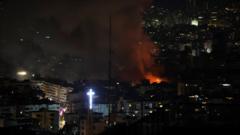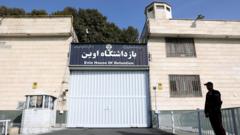In a marked escalation of military action, Israel carried out air strikes targeting suspected Hezbollah drone production facilities in southern Beirut, coinciding with the eve of Eid Al Adha. The strikes prompted widespread condemnation from Lebanese leaders, underscoring the fragile state of peace in the region.
Tensions Escalate as Israel Targets Hezbollah in Beirut Ahead of Eid Al Adha

Tensions Escalate as Israel Targets Hezbollah in Beirut Ahead of Eid Al Adha
Israel's air strikes on Beirut's southern suburbs mark a significant escalation in hostilities, raising concerns over regional stability amid a religious festival.
Israel has intensified military operations in Lebanon, with recent air strikes directed at southern Beirut’s suburbs. The Israeli Defense Forces (IDF) claim these strikes were aimed at dismantling a Hezbollah drone production unit, purportedly funded by Iran. This action came just before Eid Al Adha, a significant religious holiday in Islam, and was met with immediate evacuation warnings for residents in Hezbollah-dominated areas.
Lebanon's Prime Minister Nawaf Salam expressed strong condemnation of the strikes, asserting that they represented a systematic aggression affecting the country’s stability, especially detrimental during a holiday and tourist season. The Lebanese government has labeled the strikes as a violation of international agreements, with President Joseph Aoun emphasizing the timing as an affront to a sacred festival.
Despite a ceasefire that has been in place for six months between Israel and Hezbollah, the IDF announced their operation, describing Hezbollah’s drone capabilities as critical to attacks against Israel and accusing them of violating Lebanon-Israel agreements. The military's Arabic spokesman urged residents to evacuate specific areas known for housing Hezbollah infrastructure shortly before the attacks commenced.
The ongoing conflict has roots in historic tensions, with recent waves of violence resulting in substantial casualties and displacements in Lebanon. Since an intense conflict that commenced in October 2023, which saw Israel bombard southern Lebanon, the situation remains unstable. Despite an agreement for a ceasefire at the end of November, tensions have persisted with ongoing Israeli air strikes targeting Hezbollah assets.
This latest round of violence highlights the precarious balance in the region, alongside the longstanding grievances between Israel and Hezbollah, exacerbated by broader geopolitical tensions involving Iran. As the conflict unfolds, the risk of further escalation remains a pressing concern for both local civilians and the international community, especially given the recent historical context of violence that has already profoundly affected civilians in Lebanon.





















